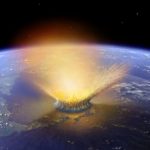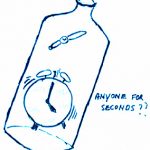Wishes and Shooting Stars
What sparked the idea of forming a society to support asteroid research?
The first decent rains at the end of summer are often associated with electrical power cuts on Hydra Island, Greece, sometimes accompanied by pyrotechnics as wiring and water get reacquainted after a long, dry season. People from wet climates regard these high-voltage fireworks with alarm, while those of us accustomed merely shrug and wonder how long it will be before the lights are fixed.
I was walking home through the dark back streets of Kamini village one night when something bright caught the corner of my eye. My first reaction was that an escaped electrical charge was streaking down an overhead wire above me—spectacular stuff, even for the DEH (the Hellenic Electrical Company)—until it disappeared behind the mountain.
I blinked in the gloom and realized that there were no overhead wires or electricity poles in the direction of the display. And it certainly hadn’t rained; stars twinkled.
The light had been falling at speed, almost sparking with intensity as it plummeted across the sky. Another awful fleeting thought was that the space shuttle had met with disaster. I had at the time been following Astronaut John Glenn’s geriatric jaunt into space with interest.
The news on television when I got home proved the power hadn’t been cut and that brave Granddad Glenn was happily floating around the Earth, surpassing weightless fitness tests and things. I concluded that what I had seen was shooting star, a meteorite, just substantially larger than most. I had never witnessed one that persistent in all my years of stargazing, one still so bright when it vanished from view that a small part of me expected to hear a thump.
I remembered an article I had read in Time magazine about asteroids.
At the time, the story struck me not so much for its content but because it hadn’t made media headlines. Life on Earth would have ceased to exist if the asteroid had been on a collision course. A couple of hours difference, and it could have been tickets for everyone, possibly even the cockroaches. It made page 82 in that week’s issue, and there wasn’t even a war on.
The editorial helmets deemed it of subimportance. Why? (This was before the blockbuster films Armageddon and Deep Impact.)
I did some research. Turns out, it’s a syndrome. Tall flightless birds suffer from the same thing; nobody wants to hear really bad news.
But what if, once having heard it, one could make one small positive gesture and never have to think on it again, disregarding all subsequent space scares because of this action? The idea became a project. Finding a legitimate way to put this concept into practice was a bureaucratic maze, but it was eventually achieved. Voila! We have FAIR.




